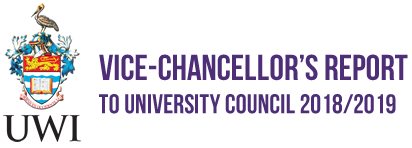Virtual training workshop on EU funding and proposal development
As The UWI expands beyond its traditional financing options, the emphasis on grant funding as a potential revenue source, particularly to support our research agenda has come into increased focus. In light of this, the University Office of Global Partnership and Sustainable Futures and the University Office of Graduate Studies and Research, in collaboration with OBREAL Global Observatory, hosted a Virtual Training Workshop on EU Funding and Proposal Development. The workshop was facilitated by Dr. Elizabeth Colucci, who specialises in strategic partnerships and development cooperation and is the Director of Projects for Observatory of Relations between the European Union and Latin America. This workshop was a continuation of Dr. Colucci's conversation with The UWI's Senior Executive Management Team initiated at the Vice-Chancellor's invitation.
Through this workshop, The UWI community gained greater insight into the current EU funding tools for higher education and research, including their rationale, objectives and the benefits that could be derived for Higher Education Institutions in the Caribbean. Participants were also afforded a greater understanding of the policy and financing mechanisms required to mobilise and develop the resources and skills for grant fund writing to strengthen the region's capacity.
During the workshop, Dr. Colucci noted that EU policies and activities in the Caribbean are a complex mix of overlapping but distant programmes and approaches that can make navigating these complexities an arduous task. This is evidenced by the fact that in recent years the Caribbean has had limited success in its EU grant funding proposals.

In anticipation of the EU's 2020 launch of its new grant funding programme with updated rules of engagement for the period 2020–2027, the workshop and The UWI's leadership in developing the region's aptitude in securing EU grant funding were opportune.
This leadership is critical as The EU is one of the few regional blocks which places focus on funding other regional integration projects. It is this focus that allows The UWI and the region to possibly gain access to fundin gthat finances projects in climate change, capacity building in Higher Education, Youth and Sport programmes, the Development of Research and Innovation Capacities and the Internationalisation of higher education.
The UWI fully understands the importance of obtaining access to EU grant funding. In 2018 it earned US $41.5 million. Yet, there is room for accessing greater levels of funding and The UWI is equipping itself to leverage this in the future.
